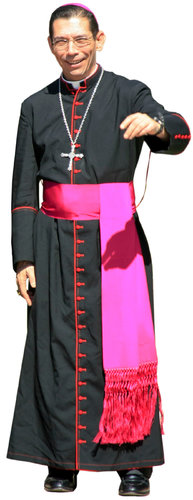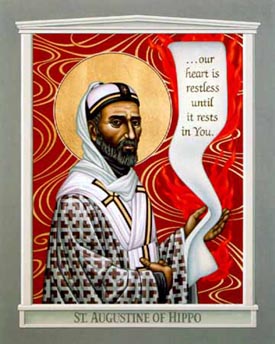If there is one consistent message regarding the meaning of Vatican II that I learned from my teachers in theology it is that the mark of  the post-Vatican II Church is dialogue. In that spirit, I was privileged to attend a conference over this past weekend hosted by the USCCB’s Committee on Doctrine titled, “The Intellectual Task of the New Evangelization,” in which fourteen bishops and approximately fifty theologians (all of whom had completed our Ph.D.’s in the last five years) gathered for three days of discussion on the roles of the theologian and the bishop in the New Evangelization. The first of these meetings was held in 2011 (which I did not attend), and the stated goal of these conferences has been to increase dialogue between bishops and theologians, a relationship that has been – to state it mildly – strained over recent years.
the post-Vatican II Church is dialogue. In that spirit, I was privileged to attend a conference over this past weekend hosted by the USCCB’s Committee on Doctrine titled, “The Intellectual Task of the New Evangelization,” in which fourteen bishops and approximately fifty theologians (all of whom had completed our Ph.D.’s in the last five years) gathered for three days of discussion on the roles of the theologian and the bishop in the New Evangelization. The first of these meetings was held in 2011 (which I did not attend), and the stated goal of these conferences has been to increase dialogue between bishops and theologians, a relationship that has been – to state it mildly – strained over recent years.
A recent article in the National Catholic Reporter seemed to indicate that those invited to attend were chosen in secret and were hand-selected by the bishops to be molded into conformity with episcopal ideology. As far as I know, however, there was a public call for applications to attend the conference (I received an open letter of invitation through my department chair), and my application was accepted despite the fact that I have openly disagreed with my local bishop over the issue of same-sex marriage. While I cannot speak to how exactly the participants were chosen, the only person I know of who was not selected was someone who did not meet the qualifications of working full-time at a Catholic college or university.
While there is good historical precedent for theologians to be wary of the intentions of the bishops in many respects, and vice-versa – indeed, the criticisms of recent theologians’ works such as Elizabeth Johnson and others seems hardly to have emerged from dialogue – I believe that the bishops are to be given credit for these efforts at increasing dialogue. Although I was not present at the first conference in 2011, from speaking with those who were it seems that the feedback provided after that first conference was taken to heart by the bishops who organized this conference. For example, there were few bishops in attendance in 2011 and almost no time for actual dialogue and informal discussion. This year fourteen bishops, including two cardinals – Cardinal Wuerl of Washington, D.C. and Cardinal George of Chicago – attended, and there was plenty of time for dialogue, discussion, and debate in small groups and less formal settings.
Given my experience over this past weekend, I offer a few signs of hope that I witnessed:
- Openness to Dialogue and Disagreement. The simple fact that this conference occurred is a sign of a desire amongst those theologians present and the current episcopal leadership to improve relationships between us. While the overall tone of the conference was congenial there was also room for us to challenge each other. For example, I sat at a table with three bishops and three theologians, where we theologians expressed concerns that academic theology is not the place to be engaged directly in catechesis and evangelization (even as we recognized that those moments do arise in our teaching). One bishop admitted that it is not fair for the bishops to expect professional theologians to make up for a lack of catechical formation at the parish and diocesan level. I was also able to voice my concerns during one of the sessions over the way in which the bishops’ public denouncements on hot-button political issues can tend to foster resentment and a view that the church is defined by what we are against, rather than what we are for.
- Seeking the Good in Culture and Others. The highlight of the conference was no doubt the talk presented by bishop Daniel Flores of Brownsville, TX (pictured at right). The full text of his talk can be found on his blog. He spoke eloquently and passionately about the suffering of his parishioners and of the deep spiritual seeking that one can find even in popular culture – he quoted from The Dresden Files, J.R.R. Tolkien, and The Hunger Games, not to mention Thomas Aquinas, Augustine, and Irenaeus, all in the same talk! He noted that we are most fully the church, and most fully living the Gospel, when we respond to the suffering of others with love in a way that was not trite or overly emotional, rather than when we denounce those with whom we disagree. I truly believe that this kind of positive affirmation is the way forward for the future of the Church.
- Eucharistic Communion. The fact that we celebrated Eucharist together twice during the conference was a reminder that ecclesiastical unity is based upon our common worship and experience of the table fellowship of the Eucharist. Certainly much prayer will be necessary to bridge divides between theologians and bishops.
I would also add a few ongoing challenges that still need to be addressed:
- Safe Space for Disagreement. While a few people mentioned the possibility that theological inquiry leads to the pushing of doctrinal boundaries, we did not have an open and honest discussion about the conflicting pressures many of us face from the hierarchy and the academy when such moments arise. In future dialogue, it would be helpful to address this issue directly. One insightful comment from a participant noted that many people today are more likely to seek out therapeutic settings or a twelve-step group than they are to go to the Church or their local pastor or bishop, precisely because they feel assured that they will be listened to and welcomed in a non-judgmental setting by a therapist or recovery group – something which they unfortunately do not always experience in the Church. The tendency for bishops to want to hold the line on doctrinal boundaries – and their use of power in doing so, even when juridically or canonically legitimate – can sometimes make it difficult for theologians and lay Catholics to feel completely at home expressing their opinions in the Church. There needs to be a safe space for dialogue where one’s sincerity and faith – or job – are not put into question based upon such a desire to inquire more deeply into the meaning of Christian life.
- Wider Range of Issues. While I noted above bishop Flores’s comments about seeking the places of goodness within modern cultural experience upon which to build the new evangelization, it is also true that the same set of issues tended to dominate much of the discussion – a culture of relativism, secularism, and a nearly exclusive emphasis upon moral issues related to sexuality and family. Pope Francis has thus far seemed to indicate that issues of violence and the kind of materialism that is fostered in a libertarian market ideology can be just as pernicious to the state of one’s soul as atheism and selfish sexual gratification. The bishops’ public message could more adequately address the full range of moral issues, and to uphold the gospel’s positive moral ideals, which the Catholic moral tradition is capable of addressing. This would go a long way toward dispelling the popular conception that the USCCB is closely aligned with the political right in politics and the culture wars. (And let me be clear, I am not suggesting that they should therefore align themselves with the left. Rather, they would do well show forth the full implications of the gospel that will both agree and conflict with many other ideologies in our culture.)
So even as we recognize the many daunting challenges for our Church and for the relationship between bishops and theologians, there are at least signs of dialogue and hope. A simple naivete over healing these rifts will not be productive, but neither will outright cynicism. Indeed, the vision that inspired the creation of CatholicMoralTheology.com arose from a desire to create a space for healthy and civil dialogue within the blogosphere and our culture. I hope the comments provided here and the relationships developed over the past weekend can be a springboard – however small – for moving forward in that dialogue that is the mark of the Church on pilgrimage with all people.



I think it is vital that the Church have safe spaces where new theological perspectives can be proposed and discussed. Unless we are able to do this without doctrinal clampdowns and theological witch-hunts, the Church will stagnate, theology will not develop, and the New Evangelisation will be seriously impaired.
Reflecting on the Latin American Bishops Aparecida document, the man who is now Pope wrote:
http://www.news.va/en/news/priests-to-face-epoch-change-as-a-challenge-to-see
God Bless
If it is indeed an open call for applicants, I would be interested in going next year, assuming I get a full-time job! They should allow the advertisement to be shared with the CTSA and CTS, though.